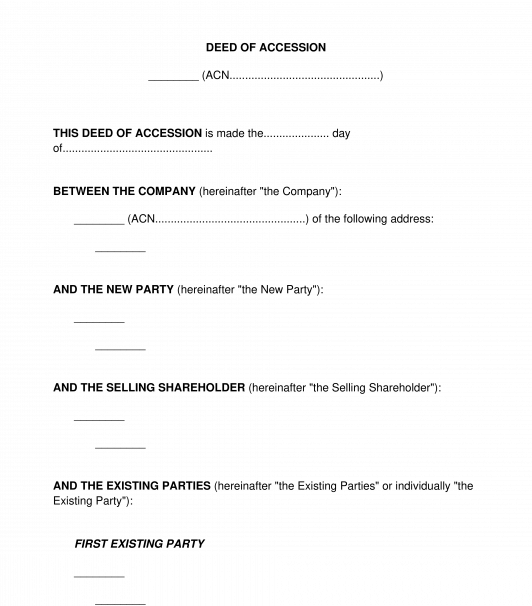 20/11/2025
20/11/2025

Answer a few questions and your document is created automatically.

Your document is ready! You will receive it in Word and PDF formats. You will be able to modify it.

 20/11/2025
20/11/2025
 Word and PDF
Word and PDF
 8 to 10 pages
8 to 10 pages
A Deed of Accession can be used by a party which wants to become a party to a pre-existing Shareholders Agreement. This is useful, because the rights and obligations set out in the Shareholders Agreement will only apply to parties which are parties to the Shareholders Agreement.
For example, if a Shareholders Agreement has been in place for a number of years, and then one of those shareholders (the "Outgoing Shareholder") decides to sell its shares to an outsider (the "New Shareholder"), the New Shareholder might need to become a party to the Shareholders Agreement. Rather than revoking the Shareholders Agreement and then creating a new one, the parties can use a Deed of Accession, which is much quicker and easier to prepare.
Alternatively, the New Shareholder might want to become a party to the Shareholders Agreement because:
- A current Shareholder is selling some (but not all) of its shares to the New Shareholder;
- The Company is issuing new shares to the New Shareholder; or
- The New Shareholder already holds Shares in the Company but just wants to enter the Shareholders Agreement.
By signing the Deed of Accession, the New Shareholder can agree to be bound by the terms of the pre-existing Shareholders Agreement. The Outgoing Shareholder can also be released from the Shareholders Agreement - meaning that its rights and obligations under that document come to an end. Effectively, the New Shareholder takes the place of the Outgoing Shareholder.
The rights and obligations set out in the Shareholders Agreement will not apply to the New Shareholder.
How to Use This Document
Firstly, the New Shareholder may need to review the Shareholders Agreement in order to ensure that it is actually willing to be bound by the terms of that Shareholders Agreement. If it has doubts then it may need to seek legal advice.
In addition, the Shareholders Agreement may set certain rules which must be met in the case of an incoming and/or outgoing shareholder. For example, in some Shareholders Agreements there is a requirement that any shareholder that wishes to leave the company first offers its shares for sale to the other shareholders, before offering them for sale to an outsider. Likewise, some Shareholders Agreements state that an incoming shareholder must sign a Deed of Accession in a particular format. In some cases, a sample copy is annexed to the Shareholders Agreement. If our document is not in the required format, then it may not actually be legally valid.
Once our Deed of Accession has been completed, each party may review it and then sign it. Each party should keep a copy for its own records. A copy should also be kept with the company's documents at the registered office of the company.
Please note that the Australian Securities and Investments Commission (ASIC) may also need to be notified about any change in shareholders or about the issue of new shares. Further information about what ASIC needs to know and about the relevant notification procedures can be found on ASIC's website. There may be penalties for failure to comply with ASIC's requirements.
This document has been designed as a deed rather than an agreement. There are certain formal requirements that need to met in order for a Deed to be validly signed. This Deed will need to be signed in accordance with those formal requirements, or it may not be legally binding.
Again, if the parties have any concerns then they should seek legal advice.
Applicable Law
The Corporations Act 2001 (Commonwealth) governs the operation of companies in Australia.
In addition, this Deed may be interpreted in accordance with general principles of contract law, as provided by the common law.
How to modify the template
You fill out a form. The document is created before your eyes as you respond to the questions.
At the end, you receive it in Word and PDF formats. You can modify it and reuse it.
Guides to help you
Country: Australia